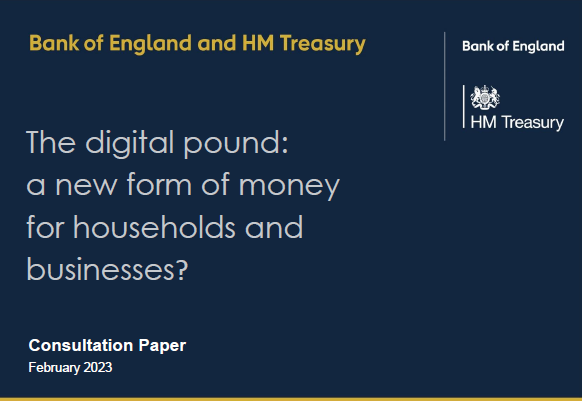Published on 15th May 2023
We have analysed the Technology Working Paper which accompanies the Bank of England’s Consultation Paper on the ‘digital pound’, and responded to the survey.
You can download our responses to the survey questions here.
The UK’s ‘digital pound’, often referred to as ‘Britcoin’, will be a Central Bank Digital Currency or ‘CBDC’.
The Technology Working Paper has little content about technology: it is mainly a series of functional requirements. In a number of cases the respondents to the survey are asked to submit their ideas, in the absence of ideas from the ‘working’ group. What have the ‘working group’ been doing all this time?
The Technology Working Paper is a really shoddy and second-rate piece of work, unworthy of the importance of the project to the nation.
The charts in it show a business model remarkably like the one for card payments now. Could this be because there is a major opportunity for players in the card payments ecosystem to enclose into their deductions-from-face-value-grabbing business model those payments that are made by cash and cheque now, where the whole value passes from buyer to seller?
As for any hope that the ‘digital pound’ will be done in the UK without restricting users’ privacy and anonymity, the paper disposes of it, whilst repeatedly claiming it does not.
It also denies there will be programmability – which means building in the ability for authorities somewhere down the line to manipulate users’ behaviour by rewarding it with a credit of ‘digital pounds’ or punishing it with a debit: a fat box entitled ‘Programmability’ sits on the system map.
The paper repeatedly inserts redundant qualifications along the lines of ‘it could work like this…if a decision were taken to implement CBDC…which it hasn’t’: HM Treasury and the Bank of England are hiring a 30-strong ‘Britcoin’ development unit. They have already decided to go ahead. It will work as laid out, reducing privacy and anonymity, and it will be paid for via deductions-from-face-value on sales proceeds, which are passed back by merchants to their customers in the form of higher prices – which has the technological name ‘price inflation’.
The British people have a right to expect better than all of this on a topic of such importance. But then the UK is run by unelected technocrats, so it should not surprise us that such a paper as this – written by technocrats selected by the Bank of England itself – should come up with a vision that serves the interests of technocrats, including the Bank of England, which is populated with unelected technocrats.

